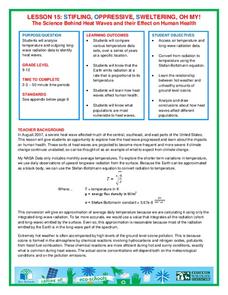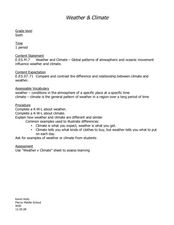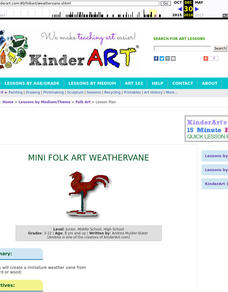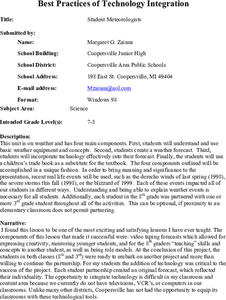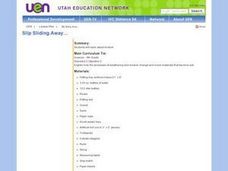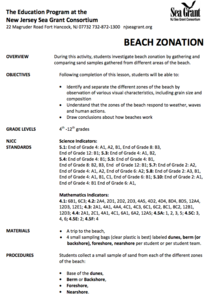Curated OER
Differences between Climate and Weather
Students collect weather data over weeks, graph temperature data and compare the temperature data collected with averaged climate data where they live.
Curated OER
Classroom Meteorologists: An Experiential Approach to Learning about Seasons and Weather
Students examine several concepts about weather in the seven lessons of this unit. This year long activity helps students to gather data seasonally about wind, clouds, precipitation, and temperature. Earth's three climate zones are...
Curated OER
Temperature and Tracking Weather
Fourth graders discuss, describe and track weather by utilizing a variety of measurable quantities as temperature, wind speed, wind direction, cloud conditions and precipitation. They assess, through experiments and practicing, how to...
Curated OER
Wild Weather Vocabulary Review
In this weather vocabulary worksheet, students are given 15 weather word definitions, and determine each word that is defined. A reference web site is given for additional activities.
Discovery Education
School of Rock
Why do rocks break down over time? Learners explore this concept by simulating physical and chemical weathering of different types of rocks. They use an abrasive to demonstrate physical weathering and acid to demonstrate chemical...
Curated OER
Drought Threatens Huge Man-Made Lake
Students locate Lake Mead, then read a news article about Lake Mead drying up and how that would effect water and power supplies to the region. In this current events lesson, the teacher introduces the article with a map and vocabulary...
National Wildlife Federation
Stifling, Oppressive, Sweltering, Oh My!
Looking for a hot date? Pick any day in August, statistically the hottest month in the United States. The 15th lesson in the series of 21 instructs pupils to investigate the August 2007 heat wave through NASA data, daily temperature...
Curated OER
Fact Or Fiction
Young scholars demonstrate their ability to distinguish between fact and fiction. Students identify the features of weather-related adages and proverbs. After reviewing several weather adages, young scholars explain whether they are...
Curated OER
Weather/Climate
Students examine traditional Native American weather/climate knowledge. They keep a weather journal and research cloud cover.
K20 LEARN
Water We Going To Do? Floodplains And Watershed Management
How has human activity affected Earth's watersheds? An action-packed lesson plan, part of the K20 Center, examines water's ability to go with the flow regardless of what is in its path. Scholars build model watersheds, examine time-lapse...
Curated OER
Forces of Change
Second graders discuss various ways in which landforms change over time. They, in groups, research and create a reference book about landform change including tsunamis, earthquakes, weathering, erosion and volcanic eruptions.
Curated OER
Folk Art Weather Vane
Students observe weather vanes and explore their purpose and history and create a miniature weather vane from cardboard or wood.
Curated OER
Student Meteorologists
Students complete a unit about weather and meteorology. They read the book "The Big Storm," use weather equipment, view local weather reports, and create a weather forecast that is videotaped and presented to a younger class.
Curated OER
Erosion: Slip Sliding Away
Fourth graders investigate the causes of erosion. Through several demonstrations including one using sugar cubes and warm water, they observe the effects of erosion. In groups, 4th graders conduct similar experiments and record their...
Curated OER
How Do Storms Influence Our Lives?
Students investigate the various ways storms influence our lives. They conduct Internet research, identify the characteristics of different storms, plot storm coordinates, and write a report on a particular storm.
Teach Engineering
Global Climate Change
The greenhouse effect and its relationship to global warming is the focus of an activity that asks class member to consider the effects of climate change on weather. Pupils work with their families to determine their carbon footprints...
Discovery Education
STEM Camp—Urban Infrastructure
Build a bridge to learning in a STEM-aligned unit about urban infrastructure. Young engineers explore the many aspects of civil planning and design in a five-day unit. Content includes the challenging aspects of balancing building with...
Curated OER
Buildings Have Lives, Too: Disasters and Their Effect on People
Students research natural disasters and their lasting effect on both people and the environment. In this environmental science lesson, students complete a group project on a natural disaster of their choosing. Students examine multiple...
Curated OER
Beach Zonation
Young scholars investigate the characteristics of the beach environment and explore beach zonation. After gathering samples from different areas of the beach, young scholars discuss how the beaches work and the characteristic of each...
Curated OER
Getting A Charge Out of the Sky
Learners investigate electricity from the sky. In this electricity lesson, students participate in an experiment to simulate the electric charges from the sky. Learners discuss results.
Microsoft
Variables
You won't want to replace the resource with anything else. Future computer scientists use Minecraft to learn about variables in computer coding. They engage in several activities to master the variable code block, then apply it in an...
Curated OER
Stormy Weather
Fifth graders demonstrate their knowledge for how animals survive in natural environments when a storm occurs. For this science/writing lesson, 5th graders engage in a listening activity with the teacher. Additionally, students write a...
Curated OER
Phenomenal Weather-Related Statistics
Eighth graders research, collect and interpret data about weather statistics. They record that data on spreadsheets. they create Powerpoint presentations on their individual or group research.
Curated OER
Twister Season Springs into Action
Students discover how weather conditions can give rise to severe storms and tornadoes. They study the different types of severe weather, how they can track conditions in their own neighborhood, and how to prepare for the worst.








